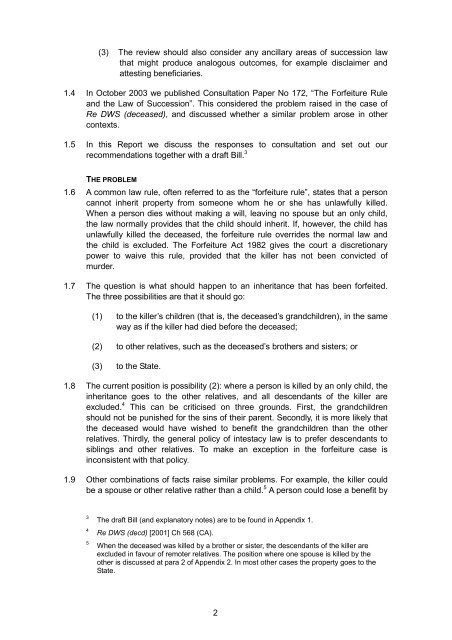The Forfeiture Rule and the Law of Succession ... - Law Commission
The Forfeiture Rule and the Law of Succession ... - Law Commission
The Forfeiture Rule and the Law of Succession ... - Law Commission
You also want an ePaper? Increase the reach of your titles
YUMPU automatically turns print PDFs into web optimized ePapers that Google loves.
(3) <strong>The</strong> review should also consider any ancillary areas <strong>of</strong> succession law<br />
that might produce analogous outcomes, for example disclaimer <strong>and</strong><br />
attesting beneficiaries.<br />
1.4 In October 2003 we published Consultation Paper No 172, “<strong>The</strong> <strong>Forfeiture</strong> <strong>Rule</strong><br />
<strong>and</strong> <strong>the</strong> <strong>Law</strong> <strong>of</strong> <strong>Succession</strong>”. This considered <strong>the</strong> problem raised in <strong>the</strong> case <strong>of</strong><br />
Re DWS (deceased), <strong>and</strong> discussed whe<strong>the</strong>r a similar problem arose in o<strong>the</strong>r<br />
contexts.<br />
1.5 In this Report we discuss <strong>the</strong> responses to consultation <strong>and</strong> set out our<br />
recommendations toge<strong>the</strong>r with a draft Bill. 3<br />
THE PROBLEM<br />
1.6 A common law rule, <strong>of</strong>ten referred to as <strong>the</strong> “forfeiture rule”, states that a person<br />
cannot inherit property from someone whom he or she has unlawfully killed.<br />
When a person dies without making a will, leaving no spouse but an only child,<br />
<strong>the</strong> law normally provides that <strong>the</strong> child should inherit. If, however, <strong>the</strong> child has<br />
unlawfully killed <strong>the</strong> deceased, <strong>the</strong> forfeiture rule overrides <strong>the</strong> normal law <strong>and</strong><br />
<strong>the</strong> child is excluded. <strong>The</strong> <strong>Forfeiture</strong> Act 1982 gives <strong>the</strong> court a discretionary<br />
power to waive this rule, provided that <strong>the</strong> killer has not been convicted <strong>of</strong><br />
murder.<br />
1.7 <strong>The</strong> question is what should happen to an inheritance that has been forfeited.<br />
<strong>The</strong> three possibilities are that it should go:<br />
(1) to <strong>the</strong> killer’s children (that is, <strong>the</strong> deceased’s gr<strong>and</strong>children), in <strong>the</strong> same<br />
way as if <strong>the</strong> killer had died before <strong>the</strong> deceased;<br />
(2) to o<strong>the</strong>r relatives, such as <strong>the</strong> deceased’s bro<strong>the</strong>rs <strong>and</strong> sisters; or<br />
(3) to <strong>the</strong> State.<br />
1.8 <strong>The</strong> current position is possibility (2): where a person is killed by an only child, <strong>the</strong><br />
inheritance goes to <strong>the</strong> o<strong>the</strong>r relatives, <strong>and</strong> all descendants <strong>of</strong> <strong>the</strong> killer are<br />
excluded. 4 This can be criticised on three grounds. First, <strong>the</strong> gr<strong>and</strong>children<br />
should not be punished for <strong>the</strong> sins <strong>of</strong> <strong>the</strong>ir parent. Secondly, it is more likely that<br />
<strong>the</strong> deceased would have wished to benefit <strong>the</strong> gr<strong>and</strong>children than <strong>the</strong> o<strong>the</strong>r<br />
relatives. Thirdly, <strong>the</strong> general policy <strong>of</strong> intestacy law is to prefer descendants to<br />
siblings <strong>and</strong> o<strong>the</strong>r relatives. To make an exception in <strong>the</strong> forfeiture case is<br />
inconsistent with that policy.<br />
1.9 O<strong>the</strong>r combinations <strong>of</strong> facts raise similar problems. For example, <strong>the</strong> killer could<br />
be a spouse or o<strong>the</strong>r relative ra<strong>the</strong>r than a child. 5 A person could lose a benefit by<br />
3 <strong>The</strong> draft Bill (<strong>and</strong> explanatory notes) are to be found in Appendix 1.<br />
4 Re DWS (decd) [2001] Ch 568 (CA).<br />
5 When <strong>the</strong> deceased was killed by a bro<strong>the</strong>r or sister, <strong>the</strong> descendants <strong>of</strong> <strong>the</strong> killer are<br />
excluded in favour <strong>of</strong> remoter relatives. <strong>The</strong> position where one spouse is killed by <strong>the</strong><br />
o<strong>the</strong>r is discussed at para 2 <strong>of</strong> Appendix 2. In most o<strong>the</strong>r cases <strong>the</strong> property goes to <strong>the</strong><br />
State.<br />
2
















